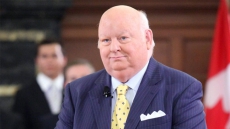OTTAWA — Canada's budget watchdog says a series of improvements to benefits for veterans, introduced in the waning days of the Harper government, will likely cost the federal treasury $231.6 million over the next decade.
The parliamentary budget office has crunched the numbers on the new retirement income security benefit for veterans over 65 and the higher earnings loss benefit for part-time reservists.
The Conservative government introduced four major changes last spring aimed at the most seriously wounded, hoping to rebuild bridges with veterans upset about gaps in the system — one the new Liberal government has vowed to improve further.
The retirement benefit is intended for severely and moderately disabled ex-soldiers who have not been in uniform long enough to qualify for a military pension. That benefit will cost $112 million over 10 years, the PBO says.
The cost of improved earnings loss benefits for part-time reservists is estimated at $118 million.
The PBO says it was not able to calculate the cost improvements to the permanent impairment allowance, nor the family caregiver benefit, which grants up to $7,238 to the families of wounded veterans.
In its report, the budget office says the improvements will push the overall cost of providing benefits to the country's ex-soldiers to $3.3 billion over the next 10 years.
The report also takes a stab at estimating precisely how much the Afghan war will cost the veterans system — in both physical and mental health payments — between now and 2025.
The budget office pegs that number at $157 million.
"These findings draw attention to the important fact that the costs of war extend beyond the Forces' withdrawal from theatre, and beyond the boundaries of (the Department of National Defence) budget," said the report.
"Despite Canada's withdrawal from Afghanistan five years ago, (Veterans Affairs Canada's) program expenses have continued to increase because of the participation of CAF members and veterans in the Afghanistan combat mission."
Researchers doing the study discovered that Veterans Affairs does not conduct analytic or actuarial projections on individual missions — or military campaigns. It simply tracks the benefits afterwards
The budget office says it's imperative that the department crunch the numbers ahead of time.
"The intent of this analysis is to ensure that these costs come as no surprise to parliamentarians, and to inform future debates pertaining to the role of the Canadian Armed Forces," the report said.
Using the size of the Afghanistan deployment in 2007 as a research model, the budget office says future governments could expect to pay as much as $145 million in veterans benefits costs over a 10-year period following a similar conflict.



